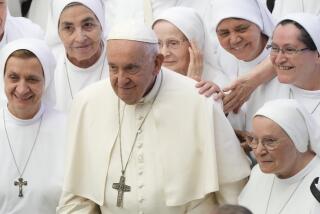Pope Blames East-West Rivalry for Third World Ills
- Share via
VATICAN CITY — Pope John Paul II Friday blamed the rivalry between East and West for social and economic ills in the Third World and delivered a sweeping indictment of totalitarianism, materialism and the “all-consuming desire for profit.”
In his seventh encyclical, the Pope accused both the U.S.- and Soviet-led blocs of imposing “imperialism” and “structures of sin” on developing nations, reducing them to “cogs on a gigantic wheel.”
He also said that rivalry between East and West was the main reason for the widening gap between rich and poor countries.
“An unacceptably exaggerated concern for security . . . deadens the impulse toward united cooperation by all,” he said.
This obsession, he said, works to “the detriment especially of peaceful peoples who are impeded from their rightful access to the goods meant for all.”
The encyclical called for reform of the international financial system and said the church could do its part by selling its “superfluous” goods to help the poor.
The 102-page document also called for democratic political change in nations with corrupt, dictatorial or authoritarian governments.
The Pope said the church took a critical view of both liberal capitalism and Marxist collectivism, saying both systems are imperfect and in need of urgent “radical correction.”
The encyclical, titled in Latin “Sollicitudo Rei Socialis,” or “The Social Concern of the Church,” included some of the strongest statements on social and economic issues made by John Paul during his 9 1/2 years as Pope.
An encyclical is a formal pastoral letter written by the Pope for the entire church. Although encyclicals are not infallible pronouncements, Catholics are expected to heed the message.
The Pope said his letter was addressed to all followers of the world’s great religions.
The letter painted a bleak picture of the process of development since the publication of Pope Paul VI’s encyclical, “Development of Peoples,” in 1967.
Twenty years later, hopes for development “appear very far from being realized,” and for many poor people “the situation has noticeably worsened,” John Paul said.
A Vatican official familiar with the drafting of the encyclical said it reflected the Pope’s Polish background and addressed issues facing people living in the Soviet Bloc that were not raised in Paul VI’s document.
Breaking new ground, John Paul singled out East-West rivalry as the cause of many of the world’s problems.
“The conflicts . . . between East and West (are) an important cause of the retardation or stagnation of the South,” he wrote. “The developing countries, instead of becoming autonomous nations concerned with their own progress . . . become parts of a machine, cogs on a gigantic wheel.
“The present division of the world,” the document added, “is a direct obstacle to the real transformation of the conditions of underdevelopment in the developing and less-advanced countries. . . .
“World peace is inconceivable unless the world’s leaders come to recognize that interdependence in itself demands the abandonment of the politics of blocs, the sacrifice of all forms of economic, military or political imperialism, and the transformation of mutual distrust into collaboration.”
In an apparent reference to conditions in his native Poland, the Pope complained of the suppression of economic initiative, which leads people to emigrate, and the denial of political and economic sovereignty in some countries.
Condemning totalitarianism, he said, “No social group, for example, a political party, has the right to usurp the role of sole leader.”
Sale of Church Goods
The Pope said the church itself should avoid accumulating “superfluous church ornaments and costly furnishings for divine worship.”
“On the contrary it could be obligatory to sell these goods in order to provide food, drink, clothing and shelter for those who lack these things,” he said.
Cardinal Roger Etchegary said the statement was mainly symbolic, recalling the time John Paul gave away his pastoral ring during a trip to Brazil. Etchegary, president of the Vatican’s Justice and Peace Commission, spoke at a news conference.
The Pope lamented the overemphasis on economic development, writing: “Development which is merely economic . . . will end up by enslaving (mankind) further.”
‘Slaves of Possessions’
The document denounced the phenomenon of “superdevelopment,” or the excessive availability of material goods in some areas that makes people “slaves of possession.”
It also condemned “all-consuming desire for profit” and “thirst for power” that afflicts both individuals and nations.
More to Read
Sign up for Essential California
The most important California stories and recommendations in your inbox every morning.
You may occasionally receive promotional content from the Los Angeles Times.










